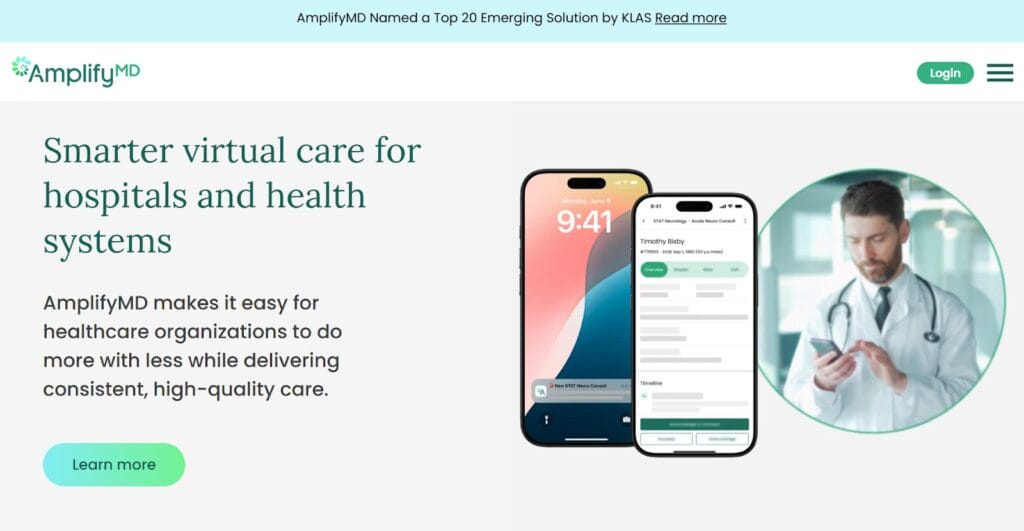Ambulatory electroencephalogram (EEG) testing has become a valuable tool for hospitals and clinics that want to expand their neurological services without relying entirely on in-house specialists. With advancements in TeleNeurology, health care facilities can now perform EEG tests and have them interpreted remotely, streamlining workflows and enhancing patient care.
How the Team Chose the Best Teleneurology Platforms
To identify the best platforms, the team evaluated leading providers based on key criteria:
- Comprehensive service: Offers multiple TeleNeurology or TeleMedicine specialties, including TeleEEG, TeleStroke and more
- Specialist access: Availability of board-certified neurologists for routine and urgent EEG readings and consultations
- Technology and integration: Secure systems that easily integrate with hospital records and monitoring tools
- Focus on ambulatory care: Supports extended EEG testing outside hospital settings for comprehensive and flexible diagnostic processes
What TeleNeurology Services Provide Point-of-Care and Ambulatory EEG Studies?
Ambulatory EEG testing allows patients to continue normal activities while having their brain activity monitored. This approach is an alternative to long-term inpatient monitoring that provides natural and accurate data collection. Here are the top five TeleNeurology platforms providing point-of-care and ambulatory EEG solutions.
1. TeleSpecialists

TeleSpecialists leads this list with a comprehensive suite of TeleNeurology services designed for hospitals and clinics. It delivers physician-led care through a secure network, ensuring hospitals can access 24/7 EEG interpretation and other urgent consultations.
Through its TeleEEG service, TeleSpecialists provides point-of-care and ambulatory EEG testing, allowing providers to deliver detailed interpretations on-site or remotely without transferring patients.
Key Features
- Constant — even emergency — access to neurologists for TeleEEG and TeleNeurology consults
- Seamless integration with existing hospital records systems and workflows
- Significant drop in Door-to-Needle (DTN) time
2. Sevaro

Sevaro specializes in delivering fast and accurate EEG readings for hospitals that may not have in-house neurologists. Its services focus on improving turnaround times for EEG interpretation and ensuring rapid access to care.
Hospitals use Sevaro’s virtual EEG services to improve decision-making and reduce patient transfers, helping teams manage neurological cases more efficiently.
Key Features
- Real-time virtual EEG interpretation for patients
- 24/7 access to board-certified neurologists
- AI-powered tools to support data-driven decisions
3. AmplifyMD

AmplifyMD provides flexible and scalable TeleNeurology services covering inpatient, outpatient, virtual and other types of care. Its services include asynchronous EEG interpretation support through its TeleStroke and TeleNeurology specialties.
Its robust software platform and ability to support ambulatory EEG services make it a strong fit for hospitals seeking reliable neurological care and efficient communication.
Key Features
- Asynchronous EEG interpretation with prompt turnaround times
- Smooth software integration with hospital systems
- Fast response times for emergent cases
4. Alina Telehealth

Alina Telehealth connects hospitals and clinics to remote neurologists for urgent and ongoing care. Its TeleStroke program enables urgent and secure consultations from board-certified neurologists and specialists skilled in EEG interpretation.
The company provides custom TeleMedicine services that adapt to an institution’s needs and patient demand, allowing them to provide quality service despite staffing challenges.
Key Features
- Secure video consultation platform
- Scalable and customizable services
- Comprehensive TeleNeurology offerings, including EEG interpretations
5. CortiCare

CortiCare is a well-known pioneer in the tele-EEG space, providing 24/7 remote monitoring for hospitals, private practices, teaching facilities and clinics nationwide. Services cater to private practices, community clinics and hospitals, and teaching hospitals.
Its ambulatory EEG service allows patients to undergo multi-day monitoring in their own environments while maintaining oversight from board-certified neurologists.
Key Features
- Continuous EEG monitoring and ambulatory testing options
- Certified neurologists available at all times
- Over 200 registered technologists and more than 40 board-certified reading physicians
Teleneurology Platforms Comparison
Examine each provider’s services and capabilities side by side.
| Provider | Ambulatory EEG Support | 24/7 Neurologist Access | Key Advantage |
| TeleSpecialists | Yes | Yes | Comprehensive teleneurology services to deliver better patient outcomes |
| Sevaro | Yes | Yes | Urgent and routine EEG interpretation can reduce turnaround times |
| AmplifyMD | Yes | Yes | Flexible platform for ambulatory EEG workflows and consults |
| Alina Telehealth | Yes | Yes | Point-of-care diagnostics and neurological consults in underserved areas |
| Corticare | Yes | Yes | Cost-effective continuous and intermittent remote monitoring to meet your needs |
What to Look for in a TeleNeurology Platform for Ambulatory EEG Testing
Selecting the right TeleNeurology partner for ambulatory EEG services is critical to your hospital’s performance and patient safety. Here are some key characteristics you should look for or evaluate when choosing a provider.
Constant Access to Board-Certified Neurologists
The availability of qualified neurologists is a fundamental requirement. A strong TeleNeurology platform ensures that board-certified neurologists are on call for routine and urgent EEG interpretations or other consultations.
Consistent — 24/7 if possible — access to neurologists ensures that if an ambulatory EEG study flags an emergency, the patient gets immediate and expert support.
Seamless Integration
Your chosen platform should integrate smoothly into your existing environment, including your records system, EEG hardware and existing hospital workflows. Deploying the new platform or service should be seamless — the platform should make processes easier for existing physicians and hospital staff and ensure quality patient care.
A Comprehensive Partnership Model
TeleNeurology is a complex area of expertise. The ideal platform should provide more than basic EEG interpretation, but partner with your facility to deliver full support. This partnership can manifest through ongoing support, performance monitoring and constant communication with necessary specialists.
If necessary, the TeleNeurology platform should help hospitals create more efficient systems through training and optimization. The corresponding software platform should also be tailor-made to measure and visualize metrics most relevant to the client, ensuring transparency and efficiency.
Robust Security and HIPAA Compliance
EEG data is highly sensitive and requires strict confidentiality. Ensure that any TeleNeurology platform you use is fully HIPAA-compliant and implements security measures like data encryption, robust access controls and secure storage.
Positive Reviews and Case Studies
A reliable TeleNeurology platform should come with proven results. Before committing to one provider, look for case studies, client testimonials or published success stories that show measurable improvements in turnaround time, patient satisfaction or hospital efficiency. Transparent metrics and consistent positive feedback are strong indicators of quality and reliability.
Why Hospitals Are Adopting Tele-Ambulatory EEG
Tele-ambulatory EEG solutions present one way for hospitals to expand their neurological care capabilities. Here are the main reasons clinics and hospitals are embracing this model.
Addressing the Neurologist Shortage
There is a well-documented neurologist shortage globally, especially in rural and community hospitals. In high-income countries, there are only 7.1 neurologists per 100,000 people, which drops to 0.1 for the same number of people in low-income regions.
Tele-ambulatory EEG helps bridge this gap by connecting hospitals with certified neurologists in real time. Through remote monitoring and interpretation, facilities can offer high-quality care without waiting for the availability of an in-person specialist.
Reducing Patient Transfers
Unnecessary transfers are costly and disruptive for patients and hospitals. Many facilities send patients to other hospitals due to a lack of on-site neurologists or EEG interpretation capabilities.
TeleNeurology and EEG testing allow hospitals to perform tests locally and send the recordings to remote neurologists for review. As a result, patients can stay close to home while receiving expert care.
Lowering Costs
Implementing TeleNeurology and ambulatory EEG programs is often more cost-effective than retaining a full-time, on-site neurology staff. Hospitals can scale their services and only pay for the services they use. This flexible model reduces overhead expenses and allows hospitals to allocate resources more effectively.
Bringing Specialized Care to Your Facility
Whether you’re a large hospital or a smaller community clinic, TeleNeurology platforms with ambulatory EEG testing ensure patients receive prompt and quality neurological care. These remote solutions also empower hospitals to expand their capabilities and improve patient outcomes.
The Editorial Team at Healthcare Business Today is made up of experienced healthcare writers and editors, led by managing editor Daniel Casciato, who has over 25 years of experience in healthcare journalism. Since 1998, our team has delivered trusted, high-quality health and wellness content across numerous platforms.
Disclaimer: The content on this site is for general informational purposes only and is not intended as medical, legal, or financial advice. No content published here should be construed as a substitute for professional advice, diagnosis, or treatment. Always consult with a qualified healthcare or legal professional regarding your specific needs.
See our full disclaimer for more details.







